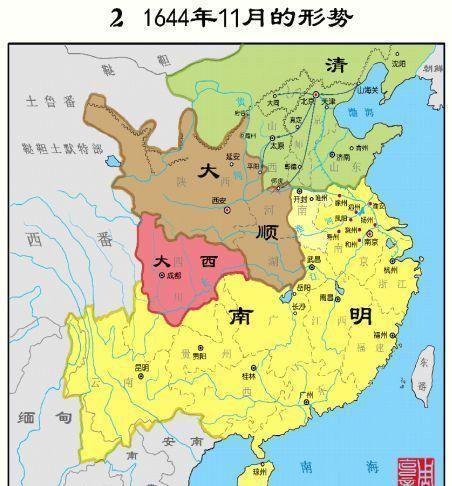First, the times create heroes, and the heavens and the earth are unyielding. The people are exhausted, and I have no pity for this.
In 1644, in the 17th year of Emperor Ming Chongzhen (the first year of qing shunzhi), in the first year of the lunar calendar, Li Zicheng attacked Beijing, the Ming Dynasty collapsed as a unified national government, and then the Qing army entered the customs. From the change of Jiashen in 1644 to 1661 [15 years of the Southern Ming Yong calendar (18 years of Qing Shunzhi)], in these more than ten years, a group of death-defying people emerged in the land of China, and went forward to maintain the orthodoxy of China. Just as some modern historians have advocated that there is no China after the Ming Dynasty, from the long-cherished wishes of the ancestors of the benevolent people, we can feel the magnificent and fierce history, and today I intend to study with the friends of the articles, one of the perfect people in Chinese history, Zhang Gongcangshui, the former soldier of the Emperor and Ming Dynasty.
In the 48th year of the Wanli Dynasty (1620 AD), Zhang Huangyan was born in Yin County, Zhejiang (present-day Ningbo). Zhang Huangyan's distant ancestor Zhang Zhibai was an official of the Song Dynasty Emperor Renzong, and he was honest and had a political voice. The Zhang family originally lived in Cangzhou, Hebei Province, and moved to Pingjiang, Hunan Province, when they knew Bai, and later moved to Yin County to settle down. When the Mongols invaded China, the Jang family floated to Goryeo to seek good survival, until the early Ming Dynasty returned to their hometown, so the locals called it "Goryeo Jang". The Zhang family was extremely filial to Ren Lun, known as "Yongmutang", Zhang Huangyan's father's name was Guizhang, dengke in the year of the Apocalypse (1624 AD), in 1631 he became the judge of the Shanxi Supervision and Transportation Department, and then transferred to Beijing as a member of the Punishment Department Wailang. Zhang Huangyan lost his mother at a young age, so he has been living with his father. Zhang Guizhang resigned from his post in the Punishment Department and returned to his hometown to teach as a profession, mostly teaching in the history of the scriptures. Huang Yan is intelligent by nature, "catchy in the book, that is, into recitation", and likes poetry: "Yu Zi dances like an elephant, and he is good at poetry." The first doctor worried about the abolition of the history of the scriptures, and whenever he thought that he was a warning, he quit his pen and did not talk about it, but he still stole it from time to time. Zhang Guizhang's national integrity was extremely heavy, and until he was imprisoned because of his huangyan resistance to the Qing, he still insisted on his position and never surrendered. Such a family environment also gives a character of loyalty. Chongzhen eight years of self-hai (1635), Huang Yan 16 years old, supplemented the yi zhusheng. At that time, the situation was in crisis, and the DPRK wanted to re-attack the military strategy, and after the righteousness, it added a test of riding and shooting. Tongkao Zhusheng did not have a single target, only Huang Yan said "pull a strong bow, draw three consecutive shots, all through the revolution, leisurely", a moment of fame in the countryside. This shows that it is both literate and military. In the fifteenth year of Chongzhen (1642), Zhang Huangyan was 23 years old and was selected in the township examination.
In 1644 (Jiashen), Li Zicheng's peasant army invaded Beijing, and Emperor Chongzhen of the Ming Dynasty hanged himself (early morning of March 19). On May 27, 1644, the Ming general Wu Sangui joined forces with the Qing troops outside Guanwai, entered the Manchu Qing Pass, occupied Beijing, and then tore off the mask of "hanging the people and cutting down crimes", moved to Nanjing, and attacked the newly established Fuwang regime in the Southern Ming. Soon after the fall of Nanjing, with Li Zicheng's defeat and retreat to Xi'an, Northern China, and the Central Plains were all lost. The Qing army marched south in a big way, and the four towns in the north of the Southern Ming River (Liu Liangzuo, Huang Degong, Liu Zeqing, and Gao Jie) were destroyed one after another. Inspector Shi Gongkefa was martyred.

Immediately the Manchu Qing divided their troops to attack Zhejiang, Ma Shiying and others fled south across the river, the Lu king Zhu Changshu surrendered, the Manchu Qing exhausted the land of western Zhejiang, and the counties of eastern Zhejiang were in a precarious situation. At this critical juncture, the people of eastern Zhejiang, who were not willing to become slaves to the country, spontaneously organized an insurgent army to save the country. First Sun Jiaji and Xiong Rulin attacked Yuyao, and then Ningbo Qian Sule and Shaoxing Zheng Zunqian recruited troops to respond, and Zhang Huangyan thus stepped onto the stage of history. At the beginning of the uprising, Qian Sule sent Huang yan to Tiantai to ask King Lu to oversee the country. "Zhang Huangyan's "Strange Zero Grass Self-Order" Quan Zuwang "Zhang Zhonglie's Public Annals" Zhu Yihai went north to supervise the country." It was the year 1645, and Huang Yan was 26 years old.
In July, all the rebel armies in eastern Zhejiang jointly served the King of Lu to supervise the country, and Huang Yan was appointed as the head of the Hanlin Academy to review the head of the command and the pedestrian secretary, and was soon transferred to the military department to shizhong. At this time, Huangyan was responsible for "raising military brigades and entering the canonical system", actively running for the cause of resisting aggression, and from this time on, Huangyan opened up a magnificent anti-Qing career.